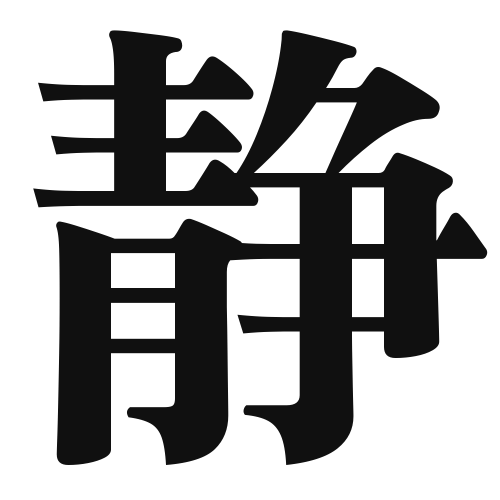1. Overview of Meaning
The kanji “静” (pronounced “sei” or “shizu”) means “quiet,” “calm,” or “silent.” It conveys a sense of tranquility and stillness, often associated with peaceful environments or states of mind.
2. Formation and Radical
Formation of the Kanji: The kanji “静” is a phonetic-ideographic character (形声文字). It combines the radical for “water” (氵) on the left, which suggests a connection to calmness, and the phonetic component “青” (meaning “blue” or “green”) on the right, which can imply a sense of serenity.
Radical: The radical of “静” is 氵, which is related to water and often signifies fluidity or calmness.
3. Examples of Usage
Common Words and Phrases:
- 静寂 (せいじゃく, seijaku) – silence, tranquility
- 静かな (しずかな, shizukana) – quiet, calm
Example Sentences in Daily Conversation:
- この公園はとても静かです。 (このこうえんはとてもしずかです。) – This park is very quiet.
- 静かな場所で勉強したいです。 (しずかなばしょでべんきょうしたいです。) – I want to study in a quiet place.
4. Synonyms and Antonyms
Similar Kanji:
- 穏 (おだやか, odayaka) – gentle, calm (implies a softer, more gentle calmness)
- 安 (あん, an) – peace, safety (focuses more on safety rather than quietness)
Antonyms:
- 騒 (さわ, sawa) – noisy, uproarious (indicates a loud or chaotic environment)
- 賑 (にぎやか, nigiyaka) – lively, bustling (suggests a vibrant and active atmosphere)
5. Cultural and Historical Background
Connection to Japanese Culture: The concept of “静” is deeply rooted in Japanese culture, where tranquility and calmness are often valued, especially in traditional practices such as tea ceremonies and Zen meditation.
Proverbs and Idioms:
- 静かなる者は勝つ (しずかなるものはかつ) – The quiet ones win, emphasizing the strength found in calmness and composure.
